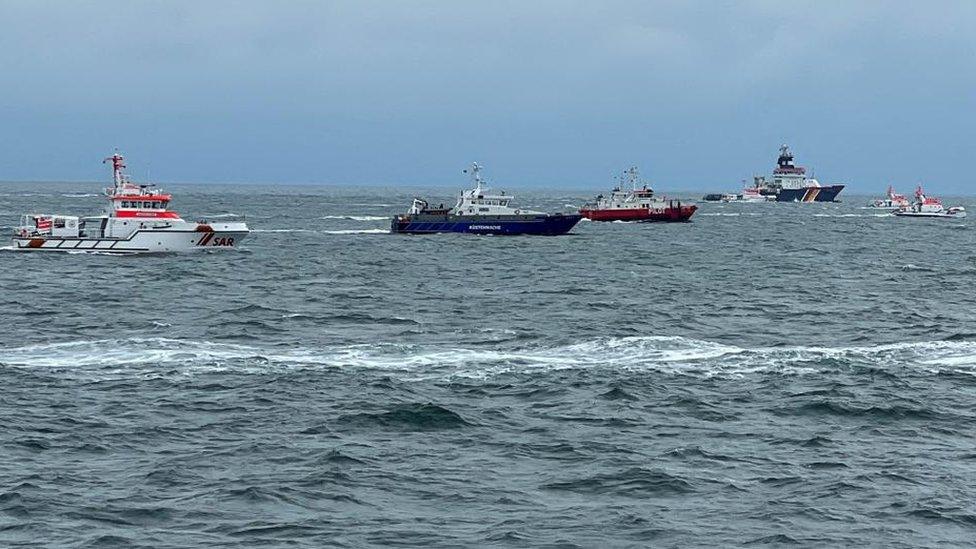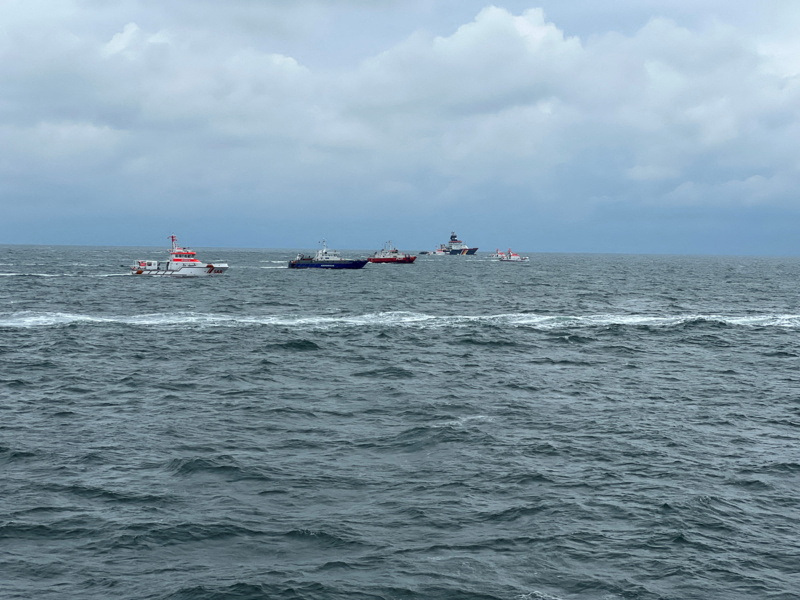North Sea Ship Collision: Search Called Off, Crew Member Missing
Is the North Sea, once a vital artery of global trade, becoming a perilous graveyard for seafarers? The recent collision between the cargo ship 'Solong' and the oil tanker 'Stena Immaculate' serves as a stark reminder of the inherent dangers and potential for catastrophic consequences that linger beneath the waves.
The events of that fateful Monday, the echoes of which still reverberate across maritime circles, paint a grim picture. British authorities, after an exhaustive search hampered by the unforgiving conditions of the North Sea, have officially called off the search for the last missing crew member of the 'Solong'. The vessel, en route to Rotterdam, met its fate in a violent encounter with the 'Stena Immaculate'. The impact, felt far beyond the immediate vicinity of the crash, has ignited a firestorm of concern regarding the escalating congestion and the perceived inadequacies in maritime safety protocols within this strategically vital region.
The wreckage, now a somber monument to potential tragedy, serves as a focal point for ongoing investigations. The 'Stena Immaculate', still smoldering in the wake of the collision, underscores the gravity of the situation. While the flames aboard the oil tanker have been subdued, the 'Solong' continues to emit smoke, a grim reminder of the ferocity of the impact and the ongoing risk of environmental damage. The maritime and coastguard agency (MCA) chief executive Virginia McVea confirmed that the 'Solong' is being held in a safe position offshore by a tug and further support vessels.
The rescue operation, a testament to the bravery and dedication of those involved, saw the safe recovery of more than 30 individuals. However, the loss of a single life, the presumed death of the missing crew member, casts a long shadow. The incident has sent ripples of concern through the maritime community, prompting scrutiny of the conditions that may have contributed to the collision, including increased traffic, challenging weather, and potential lapses in safety procedures. The location of the collision, off the coast of East Yorkshire, near the Humber Estuary, is a region of intense maritime activity, making the consequences of any incident all the more far-reaching.
The collision between the 'Solong' and the 'Stena Immaculate' has stirred up old anxieties, pushing the issue of maritime safety to the forefront of public discussion. It has ignited calls for comprehensive reviews of existing regulations, enhanced enforcement, and the deployment of the most advanced navigational technologies to avert future tragedies. These steps become all the more vital as the volume of maritime trade continues to rise, putting further stress on an already crowded sea. The incident is a strong warning about the urgent need for a more rigorous approach to maritime safety, as well as the potential for such mishaps to turn into environmental disasters.
The timing of this accident is crucial because it occurred in a complex environment, where the flow of goods and the presence of dangerous substances create added risk. The fact that the cargo ship 'Solong' was carrying toxic chemicals highlights the potential environmental hazards associated with such collisions. The aftermath of the collision serves as a grim reminder of the vulnerability of our oceans and the need for proactive measures to protect them.
The 'Solong' collision is not an isolated incident. Incidents like this can have a lasting influence. The repercussions of such events often include both immediate human tragedy and long-term damage to ecosystems, and also expose a number of challenges in terms of ensuring effective safety in a rapidly evolving maritime sector. This occurrence, which took place on a Monday, has become a moment of reflection. As the maritime world continues to grow and evolve, it is of utmost importance to remember the lessons of the past to safeguard a secure and sustainable future for all who traverse these waters.
The impact of the collision and its effects, including the fact that the ship was carrying hazardous chemicals, are now the subject of ongoing investigations, raising questions about safety precautions and emergency response strategies. The public's attention has been focused on the circumstances of this incident, sparking conversations about everything from the quality of ship maintenance to the training and preparedness of crew members. This has also made a demand for stronger oversight and stricter regulations.
The fact that the search for the missing crew member was called off after what was described as an "extensive search" underscores the formidable difficulties encountered in the search and rescue operations. The foggy and unpredictable weather conditions in the North Sea greatly hampered rescue efforts. The incident also triggered a major rescue operation by lifeboats, coast guard aircraft, and commercial vessels. The incident underscores the importance of international collaboration and coordination in such emergencies.
The incident sparked a major rescue operation involving multiple agencies and vessels. The tireless efforts of the rescue teams, though ultimately unsuccessful in finding the missing crew member, are a testament to their dedication and professionalism. The presence of flames on board the 'Stena Immaculate' added another layer of complexity and danger to the rescue effort. The investigation into the causes of the collision will be crucial in preventing similar incidents from occurring in the future. The tragic circumstances serve as a sobering reminder of the dangers faced by those who work at sea and the critical importance of maritime safety.
The incident serves as a stark reminder of the potential consequences of maritime accidents. The impact on the environment, the economic repercussions, and, most importantly, the loss of life are all factors that must be carefully considered. The maritime sector must continue to work together to find innovative solutions and implement stringent safety protocols to prevent such tragedies from happening in the future.
The occurrence on the North Sea has caused some critical considerations. The primary one is the risk to the environment, as any spill of oil or chemical cargo could have a devastating effect. The incident brings into sharp focus the need for proper training and adherence to international standards in order to improve safety in these busy waterways.
The collision in the North Sea, which involved both an oil tanker and a cargo ship, raises questions about the growing demand for maritime transport and the challenges associated with it. In order to improve the safety and sustainability of maritime operations, the industry must take action to meet the need for more effective regulations, stronger enforcement, and better technology.
| Information Category | Details |
|---|---|
| Incident Type | Collision between Cargo Ship and Oil Tanker |
| Vessels Involved | Cargo Ship "Solong" and Oil Tanker "Stena Immaculate" |
| Location | North Sea, off the coast of East Yorkshire |
| Date of Incident | Monday (Exact Date Not Specified) |
| Missing Crew Member Status | Presumed Dead |
| Number of Rescued Crew Members | Over 30 |
| Cargo of "Solong" | Toxic Chemicals (Mentioned) |
| Current Status of "Solong" | Held in Safe Position Offshore |
| Current Status of "Stena Immaculate" | Flames extinguished, still smoldering |
| Environmental Concerns | Potential for environmental disaster due to cargo and fuel |
| Rescue Operation Participants | Lifeboats, Coast Guard aircraft, commercial vessels |
| Primary Concern | Maritime safety, congestion and oversight |
| Investigation | Ongoing |
The incident, which first came to light near the Humber Estuary in East Yorkshire, resulted in a major rescue operation, led by British authorities. The use of lifeboats, Coast Guard aircraft, and commercial vessels shows the international collaboration necessary during a disaster at sea. Unfortunately, despite their best efforts, the search for one crew member on the "Solong" had to be called off, adding a sense of tragedy to this already unfortunate scenario.
The collision, and its aftermath, acts as a crucial test of the industry's capability to respond. The blaze on the "Stena Immaculate" emphasizes the necessity of being ready for dangerous scenarios. In addition, the fact that the "Solong" was carrying potentially harmful chemicals heightens the concern regarding environmental risks and the urgent need for effective containment and cleanup strategies.
The incident draws attention to the important role of regulatory bodies, who oversee maritime safety regulations and implement measures to prevent accidents. These organizations must reassess current rules, apply stronger enforcement, and provide the newest navigational technologies to address the changing nature of maritime operations. The collision near the east coast of England has resulted in a renewed focus on the subject of maritime safety.
The collision also raises concerns about the growing demand for maritime transport and the obstacles associated with it. In order to enhance the safety and sustainability of maritime operations, the sector must address the need for more effective regulations, stronger enforcement, and more advanced technologies. The ongoing investigation must also consider the effects of an event that occurred on a Monday.
The incident is a stark reminder of the dangers faced by seafarers and the critical importance of maritime safety. As the investigation continues, authorities will need to carefully examine the causes of the collision and take steps to prevent similar incidents from happening in the future. This tragic event serves as a reminder of the importance of collaboration and the constant need for vigilance in safeguarding the world's oceans.



Detail Author:
- Name : Prof. Meaghan Ward II
- Email : kunde.gregory@senger.com
- Birthdate : 1996-08-17
- Address : 60108 Emmet Fall North Cedrickbury, RI 48634
- Phone : 1-248-345-4299
- Company : Moore Inc
- Job : Waitress
- Bio : Eligendi officia praesentium nemo et harum voluptatem impedit. Et voluptatem facere ea ut molestiae repellat. Ut expedita fugiat sed odit voluptas.